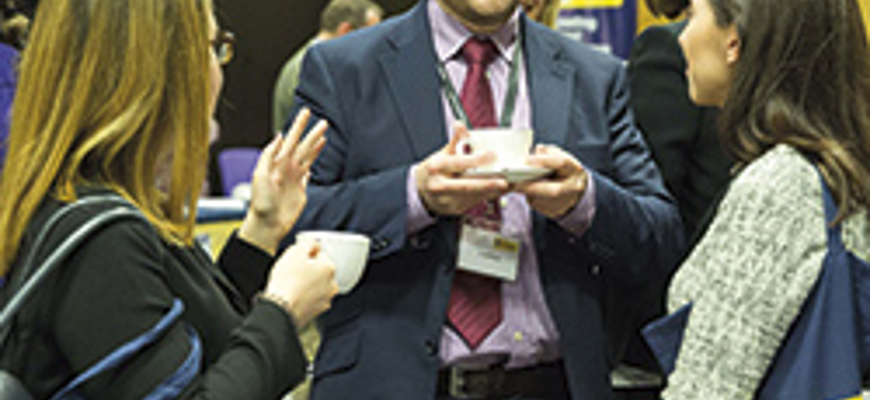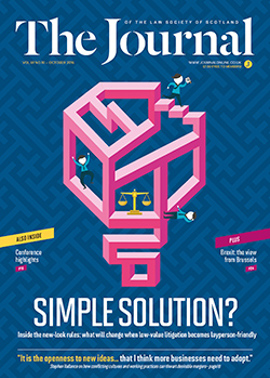Excellence in action

Legal firms of all sizes could look to alternative business structures (ABS), and the harnessing of coming IT advances in the courts, to help them face the challenges of the coming years, according to the Lord Justice Clerk, Lady Dorrian.
Delivering her keynote address at the Law Society of Scotland’s conference Leading Legal Excellence on 30 September, Lady Dorrian recalled the traditional role of the Scottish solicitor as the man (or woman) of business, and suggested that with the potential of ABS to “facilitate interaction between solicitors and other professionals in situations where advice is needed in fields other than the law,” such ventures might once again enable clients to attend at the one office for all their business needs.
While there generally seemed to be an assumption that ABS favoured only large commercial firms, she stated: “If approached imaginatively, there may be real opportunities for smaller and medium-sized firms to approach the way in which they do business in different and creative ways, enabling them to develop and maintain a competitive edge in their own markets.”
Dorrian recognised the concerns that had been expressed in relation to professional ethics, which would require to be faced up to, but contended that, coupled with technological advances, ABS might provide an answer for smaller practices struggling to maintain the provision of advice in areas of law particularly affected by cuts in legal aid.
“This is where the Digital Strategy for Justice becomes important,” she continued. “That vision for a modern, user-focused justice system that uses digital technology to deliver fast and effective justice at proportionate cost is one that may be highly relevant for solicitors looking for new ways in which to deliver legal services in an efficient and cost-effective way.”
The integrated case management system (ICMS), launching with the simple procedure in November, will deliver an online portal capable of replacing paper processes with electronic case files and allowing electronic lodging of all steps of process, sending routine correspondence and issuing of court orders. Procedural hearings will be conducted by videoconferencing. By summer of 2017, it should extend to all simple claims, enabling 60% of civil business in the sheriff court to be managed electronically, and “the medium to long term aim” is wholly electronic processes in all courts, civil and criminal.
“The reality,” the Lord Justice Clerk summed up, “is that technological innovation represents a huge opportunity:
- to make processes and procedures more efficient;
- to make evidence more reliable and more readily available;
- to make the experience of appearing in court less stressful; and
- to make justice more accessible to a wider number of people.
“It may ultimately prove significant in this regard that one of the statutory regulatory objectives specified in the Legal Services (Scotland) Act 2010 is that of promoting access to justice. Bearing that objective in mind, coupled with the opportunities which technological advances can bring, smaller firms may yet find that there are attractive ways for them to utilise new business structures.”
Brexit: a preoccupation
Opportunities for the profession are likely to arise aplenty from the Brexit process – except that no one yet knows the background against which their advice will have to work, and the two presentations dedicated to the subject were very well attended.
Commentator and blogger David Allan Green, in the second keynote speech, exposed the difficulties in which the UK Government finds or is likely to find itself in attempting to deliver its desired outcome of continuing free trade while regaining “control” of immigration levels and legal sovereignty.
For Green, the “(almost) irresistible force” of the highest-ever vote in a UK poll, the majority 17.4 million votes to leave the EU and a Government determined to implement the result, is about to encounter an “(almost) immovable object”: reality.
The complexities, the timescales, the position of the other EU member states, the need to accept a continuing influence of EU law in order to sell goods into the EU, combine to produce “a mess of the first order”, the outcome of which Green, no doubt wisely, refrained from predicting.
It was former CJEU judge Sir David Edward, in a breakout session, who provided the forensic analysis of the various models being discussed. First, he pointed out that there are no “options” that do not involve negotiation and possible ratification by some member states: it is not within the UK’s choice which outcome we have.
Further, some EU rules are unavoidable: non-EU companies are subject to the competition jurisdiction, as the likes of Microsoft have found out.
Edward’s survey of the various country models variously highlighted the limited correlation with what the UK Government currently claims that it wants (as respects Norway’s status), deadlocked negotiations with Switzerland because of entry restrictions the country has imposed, the limited access to the single market allowed to Turkey, and the limited advantages of a Canada-type agreement compared with other models.
As for the World Trade Organisation, all current agreements covering the UK were entered into as part of the EU, and other states will not be bound to offer the same terms as to the EU.
What advice did Edward have for those present? “Nothing is certain except uncertainty.” However, the UK will remain a full EU member state for at least two years, competition rules may not change, and advisers should follow the negotiations and the newsletters of trade associations and think tanks. Further, be vigilant about the possible surrender of, or prejudice to, acquired rights, and “be prepared to litigate”. Finally, he added, “Don’t trust politicians or the mainstream media.”
Asked about the prospects for Scotland being able to stay in the EU if there were a referendum vote for independence, Edward replied that he could not see “a situation in which Scotland could effortlessly remain part of the EU”. He suggested – a personal view – that it might be better in that case to look at EEA membership, as there is “a commonality of interest” with other members Norway and Iceland. That would give duty free access to the single market, and would involve signing up to the four freedoms – though no say in the EU legislative process.
Managing (yourself) for success
As always with these conferences, choices had to be made between the streamed sessions. In addition to Sir David’s presentation, I opted for two contrasting seminars on personal and career development, one led by a human resources consultant and one a panel session in which a varied lineup described their own career progression and key steps they had taken. I hope to write this up separately for a future issue. That meant opting out of the more business development-focused presentations, including one with an in-house theme, and the outlook for human rights, each of which also looked tempting.
The day wound up with Professor Steve Peters, he of “manage your inner chimp” as previewed last month. Delivering at a speed that could have tested his own seniors 200m records, but in an engaging manner (“Please challenge me, but remember I’m from Yorkshire, so who do you think is going to be right?”), Peters told us about the part of the brain – shared with primates such as chimpanzees – that follows its own agenda, sometimes in conflict with what our rational brain (our “computer”) is seeking to achieve.
Thus it is that our “chimp” can frustrate our objectives, if negative emotions or reckless impulses impact adversely on our performance. But harnessed and managed – and “manage” is the key, rather than “control”, he kept emphasising – it can help deliver a champion performance. We can’t fight our chimp; we have to accept the nature of it and work with it, all with the aim of maintaining a stable and secure frame of mind. That is the state that consistently offers the greater probability of success; and all of us, he said, move back and forwards between stability and instability each day.
“The human mode is accepting what you see; the chimp is getting upset at frustrated expectations.”
No real test for the chimp from the conference content – expectations were well met, and more.
In this issue
- Legal protection of adults – an international comparison
- The UPC post-Brexit: unified, “emmental-ed”, or dead?
- Proof of purpose: IHT and APR
- Bankruptcy consolidated: what do I need to know?
- Dividends – compliant but challengeable?
- FGM mandatory reporting: an example to follow?
- Reading for pleasure
- Opinion: Neil Hay
- Book reviews
- Profile
- President's column
- Next pieces of the jigsaw
- People on the move
- Beginner's guide
- As simple as that?
- Excellence in action
- "That is not how we do it here"
- Rebranding in the digital age
- Brexit: Brussels in a holding pattern
- Common areas: keep Pandora's box shut
- Police: qualified experts?
- Is that overprovision policy watertight?
- Impact assessments still important
- The vital paper trail
- Scottish Solicitors' Discipline Tribunal
- Controlling interests: problem questions
- Law under orders
- Prisoner correspondence: a reminder
- Law reform roundup
- Society, Parliament revamp law student competition
- Foundation for aspiration
- Payment fraud: take five
- Ask Ash
- Better together?
- Paralegal pointers






